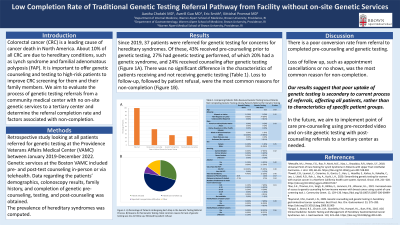Tuesday Poster Session
Category: Practice Management
P4090 - Low Completion Rate of Traditional Genetic Testing Referral Pathway From Facility Without On-Site Genetic Services
Tuesday, October 24, 2023
10:30 AM - 4:00 PM PT
Location: Exhibit Hall

Has Audio

Aastha Chokshi, MD
Brown University
Providence, RI
Presenting Author(s)
Aastha Chokshi, MD1, Averill Guo, MD2, Eric Smith, BA1, Kittichai Promrat, MD1
1Brown University, Providence, RI; 2Brown University/Warren Alpert Medical School, Providence, RI
Introduction: Colorectal cancer (CRC) is a leading cause of cancer death in North America. About 10% of all CRC are due to hereditary conditions, such as Lynch syndrome and familial adenomatous polyposis (FAP). It is important to offer genetic counseling and testing to high-risk patients to improve CRC screening for them and their family members. Due to limited availability of genetic counselors, many medical facilities do not have on-site genetic services. We aim to evaluate the process of genetic testing referrals from a community medical center with no on-site genetic services to a tertiary center and determine the referral completion rate and factors associated with non-completion.
Methods: We conducted a retrospective study looking at all patients referred for genetic testing at the Providence Veterans Affairs Medical Center (VAMC) between January 2019-December 2022. Genetic services at the Boston VAMC included pre- and post-test counseling in-person or via telehealth. Blood samples were collected at the Providence VAMC and sent to a commercial lab. Data regarding the patients’ demographics, colonoscopy results, family history, and completion of genetic pre-counseling, testing, and post-counseling was obtained. The prevalence of hereditary syndromes was computed. Chi-square analysis was used to compare patients receiving and not receiving genetic testing.
Results: Since 2019, 37 patients were referred for genetic testing for concerns for hereditary syndromes. Of these, 43% received pre-counseling prior to genetic testing, 27% had genetic testing performed, of which 20% had a genetic syndrome, and 24% received counseling after genetic testing (Figure 1A). There was no significant difference in the characteristics of patients receiving and not receiving genetic testing (Table 1). Loss to follow-up, followed by patient refusal, were the most common reasons for non-completion (Figure 1B).
Discussion: There is a poor conversion rate from referral to completed pre-counseling and genetic testing. Loss of follow up, such as appointment cancellations or no shows, was the most common reason for non-completion. Our results suggest that poor uptake of genetic testing is secondary to current process of referrals, affecting all patients, rather than to characteristics of specific patient groups. In the future, we aim to implement point of care pre-counseling using pre-recorded video and on-site genetic testing with post-counseling referrals to a tertiary center as needed.

Disclosures:
Aastha Chokshi, MD1, Averill Guo, MD2, Eric Smith, BA1, Kittichai Promrat, MD1. P4090 - Low Completion Rate of Traditional Genetic Testing Referral Pathway From Facility Without On-Site Genetic Services, ACG 2023 Annual Scientific Meeting Abstracts. Vancouver, BC, Canada: American College of Gastroenterology.
1Brown University, Providence, RI; 2Brown University/Warren Alpert Medical School, Providence, RI
Introduction: Colorectal cancer (CRC) is a leading cause of cancer death in North America. About 10% of all CRC are due to hereditary conditions, such as Lynch syndrome and familial adenomatous polyposis (FAP). It is important to offer genetic counseling and testing to high-risk patients to improve CRC screening for them and their family members. Due to limited availability of genetic counselors, many medical facilities do not have on-site genetic services. We aim to evaluate the process of genetic testing referrals from a community medical center with no on-site genetic services to a tertiary center and determine the referral completion rate and factors associated with non-completion.
Methods: We conducted a retrospective study looking at all patients referred for genetic testing at the Providence Veterans Affairs Medical Center (VAMC) between January 2019-December 2022. Genetic services at the Boston VAMC included pre- and post-test counseling in-person or via telehealth. Blood samples were collected at the Providence VAMC and sent to a commercial lab. Data regarding the patients’ demographics, colonoscopy results, family history, and completion of genetic pre-counseling, testing, and post-counseling was obtained. The prevalence of hereditary syndromes was computed. Chi-square analysis was used to compare patients receiving and not receiving genetic testing.
Results: Since 2019, 37 patients were referred for genetic testing for concerns for hereditary syndromes. Of these, 43% received pre-counseling prior to genetic testing, 27% had genetic testing performed, of which 20% had a genetic syndrome, and 24% received counseling after genetic testing (Figure 1A). There was no significant difference in the characteristics of patients receiving and not receiving genetic testing (Table 1). Loss to follow-up, followed by patient refusal, were the most common reasons for non-completion (Figure 1B).
Discussion: There is a poor conversion rate from referral to completed pre-counseling and genetic testing. Loss of follow up, such as appointment cancellations or no shows, was the most common reason for non-completion. Our results suggest that poor uptake of genetic testing is secondary to current process of referrals, affecting all patients, rather than to characteristics of specific patient groups. In the future, we aim to implement point of care pre-counseling using pre-recorded video and on-site genetic testing with post-counseling referrals to a tertiary center as needed.

Figure: Figure 1. A) Percentage of Patients Undergoing Each Step in the Genetic Testing Referral Process. B) Reasons for No Genetic Testing. Most common reason for lack of genetic testing was loss to follow up, followed by patient refusal.
Disclosures:
Aastha Chokshi indicated no relevant financial relationships.
Averill Guo indicated no relevant financial relationships.
Eric Smith indicated no relevant financial relationships.
Kittichai Promrat indicated no relevant financial relationships.
Aastha Chokshi, MD1, Averill Guo, MD2, Eric Smith, BA1, Kittichai Promrat, MD1. P4090 - Low Completion Rate of Traditional Genetic Testing Referral Pathway From Facility Without On-Site Genetic Services, ACG 2023 Annual Scientific Meeting Abstracts. Vancouver, BC, Canada: American College of Gastroenterology.
